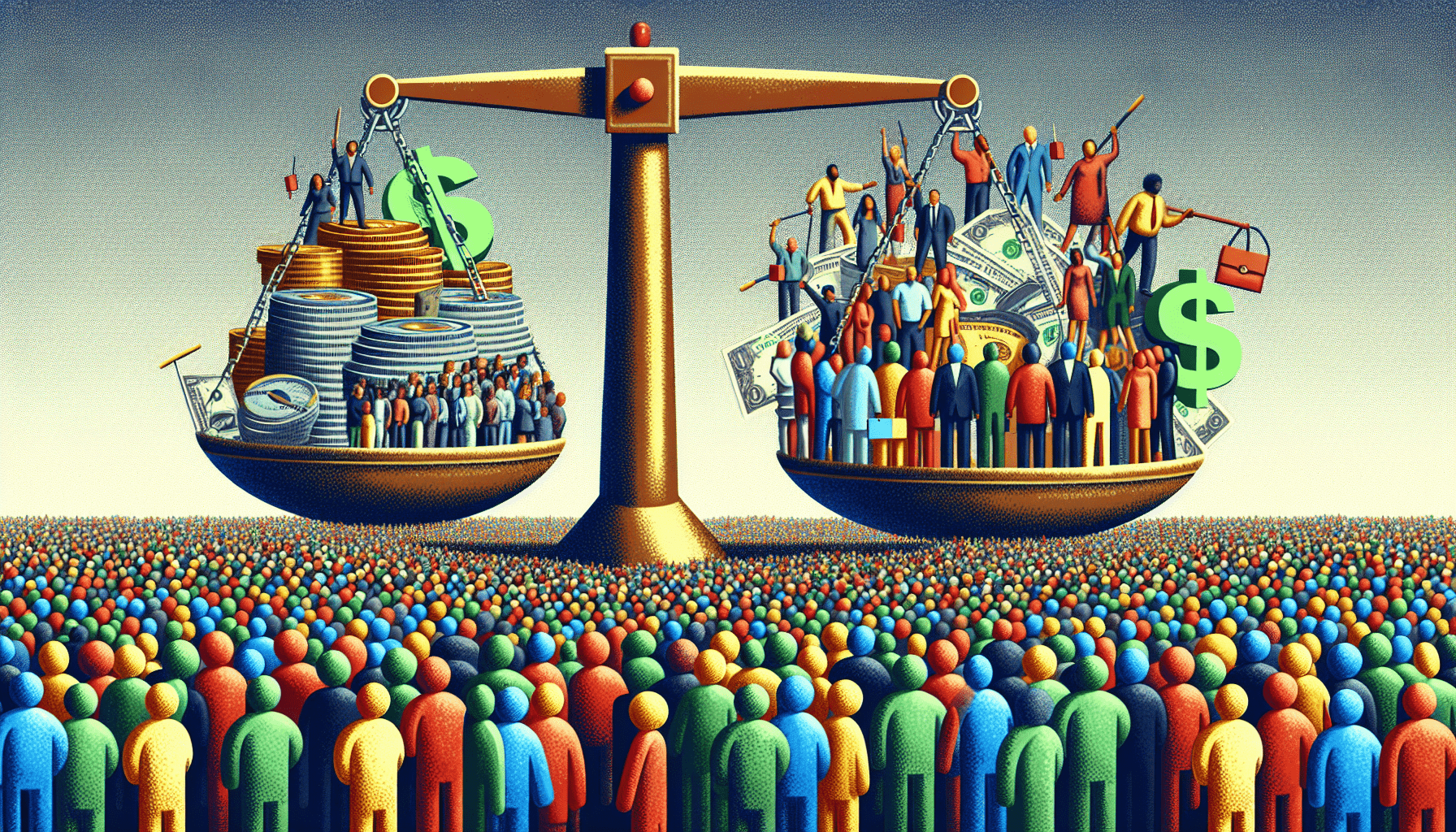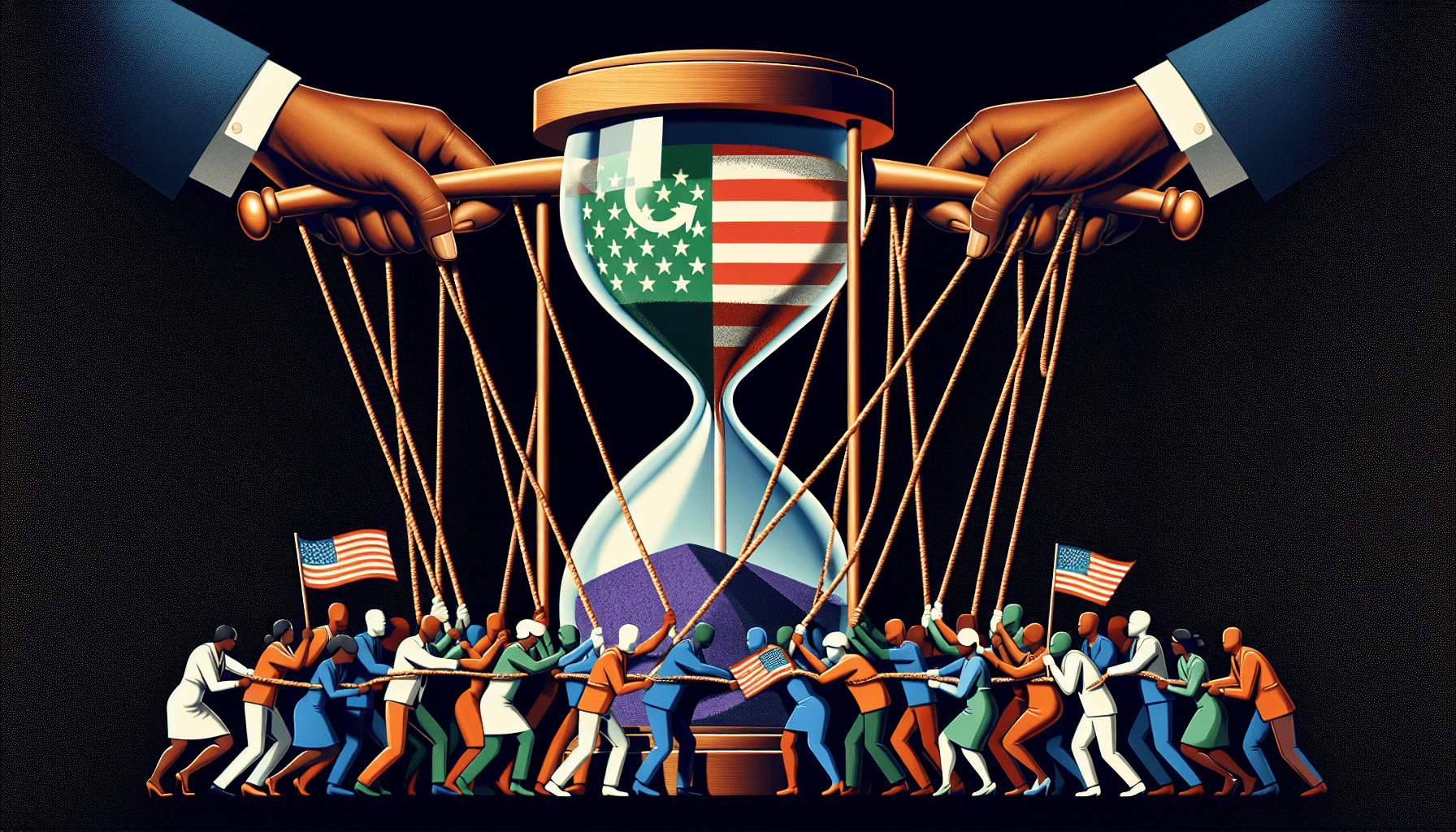In the ever-evolving landscape of US politics, public opinion holds significant sway in the formulation of policies surrounding the national debt. The opinions and concerns of the general public can often shape the decisions made by policymakers, as they strive to meet the needs and expectations of the citizens they serve. Understanding the role that public opinion plays in shaping these policies is crucial to comprehending the dynamic relationship between the government and the people when it comes to matters of national debt.

Understanding Public Opinion
Definition of public opinion
Public opinion refers to the collective views, beliefs, and attitudes of the general public on specific issues or topics. It encompasses the opinions of individuals within a society and represents the prevailing sentiment on various matters. Public opinion is influenced by personal experiences, social interactions, media exposure, and other factors, and it plays a crucial role in shaping policies and decision-making processes.
The formation of public opinion
Public opinion is not static; it evolves and forms through a complex process. It is shaped by various factors, including personal values, socioeconomic background, education, cultural influences, and exposure to different sources of information. Individuals gather information, evaluate it, engage in discussions, and form their opinions based on their perspectives and beliefs. Public opinion can also be influenced by political leaders, interest groups, and the media, which have the power to sway and shape public sentiment.
Measuring public opinion
Assessing public opinion is vital for policymakers to gauge the views and concerns of the general population. Various methods are utilized to measure public opinion, including surveys, opinion polls, focus groups, and social media analysis. Surveys and polls often involve representative samples of the population and ask individuals for their opinions on specific issues. Focus groups allow for in-depth discussions to capture nuanced perspectives. Social media analysis examines online conversations and sentiment to understand public opinion trends. These methods provide valuable insights that help policymakers understand the public’s stance on critical matters such as the national debt.
National Debt in the United States
Understanding of US national debt
The national debt in the United States refers to the cumulative amount of money owed by the federal government. It includes outstanding loans, bonds, and other forms of debt incurred to finance government spending and address budget deficits. The national debt is a reflection of the government’s borrowing to bridge the gap between revenue and expenditure. As of [current date], the U.S. national debt stands at [current national debt amount], representing a significant fiscal challenge.
Historical context of US national debt
The history of the U.S. national debt can be traced back to the founding of the nation. The issuance of debt began during the American Revolution to fund the war effort. Over time, the debt fluctuated as the country faced economic recessions, wars, and significant events such as the Great Depression and World Wars. It experienced both periods of growth and efforts towards debt reduction. Understanding the historical context of the U.S. national debt provides valuable insights into the complexities and long-term implications of managing the debt.
Current state of the US national debt
Currently, the U.S. national debt is a matter of significant concern. It has been steadily increasing, reaching unprecedented levels. Factors contributing to its growth include increased government spending, tax policies, economic downturns, and the cost of social welfare programs. The COVID-19 pandemic has also contributed to a surge in government spending, exacerbating the national debt further. The current state of the national debt necessitates a comprehensive understanding of its implications and the need for effective debt management strategies.
Political Influence on US National Debt
Role of government in national debt
Government plays a significant role in shaping the national debt through its fiscal policy decisions. The government determines the levels of spending, taxation, and borrowing, which directly impact the debt. It has the authority to set budget priorities, allocate resources, and implement economic policies that influence the debt trajectory. The government’s role in managing the national debt is critical in maintaining economic stability and ensuring sustainable fiscal practices.
Influence of political parties on national debt
Political parties have distinct ideologies and policy preferences that impact their stance on fiscal matters, including the national debt. These differences shape the priorities and approaches each party takes in addressing the debt. Some parties may advocate for increased government spending to stimulate economic growth, while others favor austerity measures and reducing government expenditure. The influence of political parties on the national debt is evident in their policy agendas and the decisions they make when in power.
Decision making and policies regarding national debt
Decisions regarding the management of the national debt involve complex considerations. Policymakers must weigh various factors such as economic conditions, social priorities, and long-term sustainability. They need to balance the immediate needs of the country with the potential consequences of excessive debt. Policy choices surrounding the national debt involve trade-offs and require careful deliberation to ensure the well-being of the economy and the financial stability of the nation.
Public Opinion on National Debt
Public knowledge about national debt
Public awareness and understanding of the national debt are critical in shaping public opinion. However, studies suggest that many Americans lack a comprehensive understanding of the debt’s implications and its long-term consequences. Surveys have shown that individuals often overestimate the debt’s magnitude or misunderstand its impact on the economy. Enhancing public knowledge and awareness of the national debt is essential to foster informed public opinion and facilitate meaningful discussions on debt-related policies.
Public concern regarding national debt
The national debt is a matter of concern for many Americans. Studies indicate that public anxiety about the debt has increased in recent years, particularly among younger generations. Concerns about the potential burden on future generations, the impact on economic growth, and the sustainability of social welfare programs contribute to public apprehension. The perceived threat to national security and the economy fuels public unease and underscores the importance of addressing the national debt.
Public attitudes towards national debt solutions
Public attitudes towards solutions for addressing the national debt vary. Some individuals advocate for increased government spending to stimulate economic growth, while others emphasize the need for responsible fiscal management and reducing the debt burden. Public opinion is shaped by personal values, economic circumstances, and exposure to different perspectives. Understanding the diverse range of attitudes towards national debt solutions is crucial for policymakers to develop effective strategies and policies that align with public sentiment.

Impact of Public Opinion on Policymaking
Role of public opinion in democratic process
Public opinion plays a fundamental role in the democratic process by providing a means of gauging public sentiment and incorporating it into decision-making. In a representative democracy, policymakers are accountable to the public and their opinions. Public opinion serves as a form of feedback, allowing policymakers to gauge the acceptability and feasibility of policies. As such, public opinion acts as a vital mechanism in shaping policy choices that align with the interests and values of the electorate.
Mechanisms through which public opinion affects policy
Public opinion influences policymaking through various mechanisms. One effective method is through elections, as politicians often prioritize issues that resonate with voters during campaign periods. Additionally, public opinion can be channeled through interest groups, advocacy organizations, and grassroots movements that exert pressure on policymakers. Public opinion can also impact policymaking indirectly by shaping the media narrative and influencing public discourse, which in turn sways politicians’ positions on specific policy matters.
Examples of public opinion influencing policy
There have been numerous instances in which public opinion has influenced policy decisions regarding the national debt. For instance, public backlash against excessive government spending during the 2010 Tea Party movement influenced policymakers’ efforts to rein in spending and promote austerity measures. Similarly, public concerns about the social and economic consequences of high levels of debt have prompted policymakers to prioritize debt reduction measures. These examples demonstrate how public opinion can effectively shape policies related to the US national debt.
Interplay Between Public Opinion and National Debt Policy
Public pressure on national debt policy
Public pressure plays a crucial role in shaping national debt policy. When the public expresses high levels of concern or demands action on the debt, policymakers are more likely to prioritize debt-related issues. Public pressure can be exerted through various means, including protests, lobbying efforts, petitions, and public opinion expressed through surveys or polls. The perceptible impact of public pressure often influences the policy agenda and shapes decision-making processes.
Policy responsiveness to changes in public opinion
Policymakers are incentivized to be responsive to changes in public opinion, particularly on issues as critical as the national debt. They recognize that the electorate holds them accountable for their policy choices, and ignoring or dismissing public sentiment can have severe political consequences. Policymakers may adjust their policy priorities or propose new solutions based on shifts in public opinion to maintain public trust and ensure their re-election prospects.
Impact of public opinion on lawmakers’ decisions regarding national debt
Public opinion can significantly influence lawmakers’ decisions regarding the national debt. Lawmakers are directly accountable to their constituents and rely on their support for re-election. As a result, the views and concerns expressed by the public hold weight and can sway policymakers’ positions on debt-related matters. Supportive public opinion can provide lawmakers with the confidence to pursue bold debt-reduction actions, while opposition from the public may compel them to reassess their stance or seek alternative solutions.
Media’s Role in Shaping Public Opinion
Media portrayal of national debt
The media plays a vital role in shaping public opinion on the national debt through its portrayal and coverage of debt-related issues. Media outlets can frame the national debt as an urgent crisis or as a manageable challenge, depending on their editorial stances and narratives. The language, tone, and emphasis used in news reporting can influence public perception and understanding of the debt. Media coverage has the power to evoke emotional responses, shape public debate, and ultimately impact public opinion on national debt policies.
Media influence on public perception of national debt
The media’s influence on public perception of the national debt is significant. The way the media disseminates information and constructs narratives can shape how individuals perceive the severity and urgency of the debt issue. Media outlets that predominantly highlight the negative implications of the debt may contribute to heightened public concern, whereas those that offer nuanced perspectives and expert analysis can help foster a clearer understanding of the complexities surrounding the debt. Media literacy and critically evaluating media sources are essential for a well-informed public.
Influence of social media on public opinion
Social media platforms have emerged as influential factors in shaping public opinion on various issues, including the national debt. These platforms provide spaces for individuals to express their views, share information, and engage in discussions. Public opinion on social media can be influenced by echo chambers and algorithms that reinforce individuals’ existing perspectives. However, social media also allows for the dissemination of diverse opinions and can facilitate dialogue and awareness about the national debt. Understanding the influence of social media on public opinion is crucial for policymakers and media organizations alike.
Public Opinion and Political Accountability
Role of public opinion in holding policymakers accountable
Public opinion serves as a crucial mechanism for holding policymakers accountable. In a democratic society, elected officials are expected to represent the interests of their constituents. Public opinion acts as a form of evaluation that determines whether policymakers are delivering on their promises and addressing the concerns of the electorate. Public scrutiny and feedback through public opinion contribute to political accountability and can shape policy decisions regarding the national debt.
Impact of public scrutiny on national debt policy
Public scrutiny plays a significant role in shaping national debt policy. When the public closely monitors government decisions and demonstrates a strong interest in debt-related issues, policymakers are more likely to prioritize debt reduction strategies. Increased public scrutiny can lead to greater transparency, accountability, and efforts to address the national debt. It creates an environment where policymakers must justify their actions and provide explanations for their debt-related policies.
Examples of public opinion prompting policy changes
Public opinion has prompted policymakers to make significant policy changes related to the national debt. For instance, public concerns about the rising debt levels prompted Congress to establish the Budget Control Act of 2011, which aimed to address the debt through spending reductions. Similarly, public support for fiscal responsibility and debt reduction influenced policymakers’ decisions during debates over raising the national debt ceiling. These examples illustrate the power of public opinion in prompting policy changes and shaping the national debt discourse.

Case Studies of Public Opinion Affecting National Debt Policy
Public opinion and the issue of governmental austerity measures
During the aftermath of the 2008 financial crisis, public opinion played a pivotal role in shaping policies related to governmental austerity measures. As concerns about the national debt and fiscal responsibility grew, there was significant public pressure to reduce government spending and implement austerity policies. Public opinion influenced lawmakers’ decisions, leading to widespread spending cuts, reforms in entitlement programs, and efforts to curtail the growth of the national debt.
Public opinion and the national debt ceiling debates
One prominent case that exemplifies the impact of public opinion on national debt policy is the national debt ceiling debates. Public opinion significantly affected policymakers’ decisions during these debates, particularly regarding the consequences of failing to raise the debt ceiling. Public pressure to avoid a potential economic crisis and preserve the nation’s financial stability influenced policymakers’ choices. The debates showcased the interplay between public sentiment, political interests, and the necessity for responsible debt management.
Government responses to public opinion on national debt
Government responses to public opinion on the national debt have varied throughout history. While public concerns may prompt policymakers to address the debt, the policy choices implemented differ depending on the political landscape and prevalent ideologies. Some responses may include increased government transparency, bipartisan efforts for debt reduction, and initiatives to educate the public on the complexities of the debt. Understanding these government responses helps shed light on the reciprocal relationship between public opinion and debt-related policies.
Future Implications of Public Opinion on US National Debt
Predicting future trends in public opinion
Predicting future trends in public opinion is a complex task due to the evolving nature of public sentiment. Factors such as economic conditions, political events, and demographic shifts influence public opinion. However, increased awareness and education on the national debt, ongoing political debates, and the ongoing impacts of the COVID-19 pandemic are expected to shape future public opinion. Analyzing these factors and monitoring shifts in public sentiment can provide insights into potential future directions of public opinion on the US national debt.
Potential changes to national debt policy in response to public opinion
Public opinion can drive changes in national debt policy, and policymakers must be responsive. In response to public concerns, policymakers may prioritize debt reduction measures, implement fiscal reforms, or propose new policies to address the debt. Public sentiment can also influence the allocation of resources, including budgetary decisions that impact spending priorities. Anticipating potential shifts in public opinion and understanding its implications on national debt policy is crucial for policymakers to adapt and respond effectively.
The role of public opinion in sustainable national debt management
Public opinion plays a critical role in sustainable national debt management. Informed and engaged citizens hold policymakers accountable for their debt-related policy choices. Public opinion acts as a feedback mechanism, guiding policymakers towards responsible fiscal decisions that consider the long-term implications of the debt on the economy and future generations. Promoting public education, fostering public discourse, and maintaining a dialogue between policymakers and the public are essential for achieving sustainable national debt management.
In conclusion, public opinion exerts significant influence on policies related to the US national debt. Understanding public opinion, its formation, and measurement is vital for policymakers to make informed decisions. The national debt in the United States is a complex issue with a historical context that shapes its significance. Political parties and the government play crucial roles in addressing the national debt, while public opinion serves as a mechanism for accountability and shaping policymaking. The media, social media, and public scrutiny contribute to the interplay between public opinion and national debt policy. Case studies highlight the impact of public opinion on specific issues, such as governmental austerity measures and the national debt ceiling debates. Predicting future trends in public opinion and adapting national debt policy accordingly is essential for sustainable debt management. Ultimately, public opinion is a powerful force in shaping policies related to the US national debt, and efforts to foster informed, engaged, and responsible public opinion are essential for the nation’s financial well-being.


